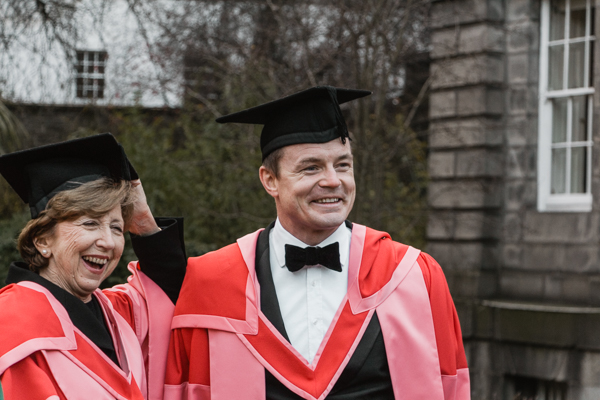Irish rugby player Brian O’Driscoll and broadcaster Olivia O’Leary were among five people recognised for their contribution to society at Trinity’s honorary degree ceremony today.
Joining O’Driscoll and O’Leary to receive honorary degrees were former Senior Archivist of the National Archives Catriona Crowe, pioneering researcher Gero Miesenböck and astrophysicist George Miley. With the ceremony conducted completely in Latin, the degrees were awarded by Chancellor of the University, Mary Robinson, with Provost Patrick Prendergast in attendance.
O’Driscoll, who was awarded a Doctor in Laws, is the most-capped Irish rugby player and the second most-capped player in rugby union history. His ability as a player has been recognised across the world with his contribution to the Irish rugby team alone immense. Having played 141 test matches, he was the highest try scorer of all time in Irish rugby, racking up 46 tries for the national side.
In a press statement, Trinity’s Public Orator Prof Anna Chahoud, described his on-field presence as “Herculean, sensational, world-class”. Listing his achievements, such as his outstanding debut against France, to his career with Leinster, she quoted a fan to answer how he achieved these feats: “He assaults the impossible in a quest to reach the upper slopes of human endeavour.”
Also conferred with a Doctor in Laws, journalist O’Leary is most known for hosting a range of flagship programmes such as Today Tonight, Prime Times and Question and Answers. Well-known as a force in Irish political journalism, Chahoud called her “the voice of the uncompromising quest for the truth”.
Crowe, the recently retired Senior Archivist of the National Archives of Ireland, was awarded a Doctor in Letters for championing public history. An authority on the state’s modern records, Crowe was awarded for her contribution to learning. Commenting on her award, Chahoud said that Ireland had “no stronger advocate of fairness, respect and historical truth” than Crowe. Her lifelong commitment, said Chahoud, “has powerfully demonstrated that the strongest foundation of a fairer future lies in the unbiased and responsible analysis of our past”.
Pioneer of the field of optogenetics research, Miesenböck, Waynflete Professor of Physiology and Director of the Centre for Neural Circuits and Behaviour at the University of Oxford, was awarded a Doctor in Science for his outstanding contribution to this new field. Optogenetics allows the function of specific neurons in the intact brain to be remote-controlled with light and Miesenböck used this to investigate areas such as sleep, learning and memory and action choice. “The questions he tackles are daring”, said Chahoud of his research. “His method is both revolutionary and wonderfully simple in its concept.”
Miley, the final awardee, Emeritus Professor of Astronomy at Leiden University, also received a Doctor in Science. A Dublin native, he has previously been awarded a Dutch knighthood for his service to astronomy and society. Miley’s work focuses on using astronomy as a tool for education, especially for very young children. Miley’s work initiated the Low Frequency Array (LOFAR) telescope, a revolutionary addition to astronomy, and allowed people across Europe to explore the universe. “Astronomy is a perfect tool for education of people of all ages and social backgrounds: we are all equal under the sky”, said Chahoud.
Honorary degrees are traditional in universities across the world to recognise world-leaders. Earlier this year, Bob Geldof was awarded an honorary degree and previous awardees include former US Vice-President Joe Biden, President Michael D Higgins and Irish poet Michael Longley.







